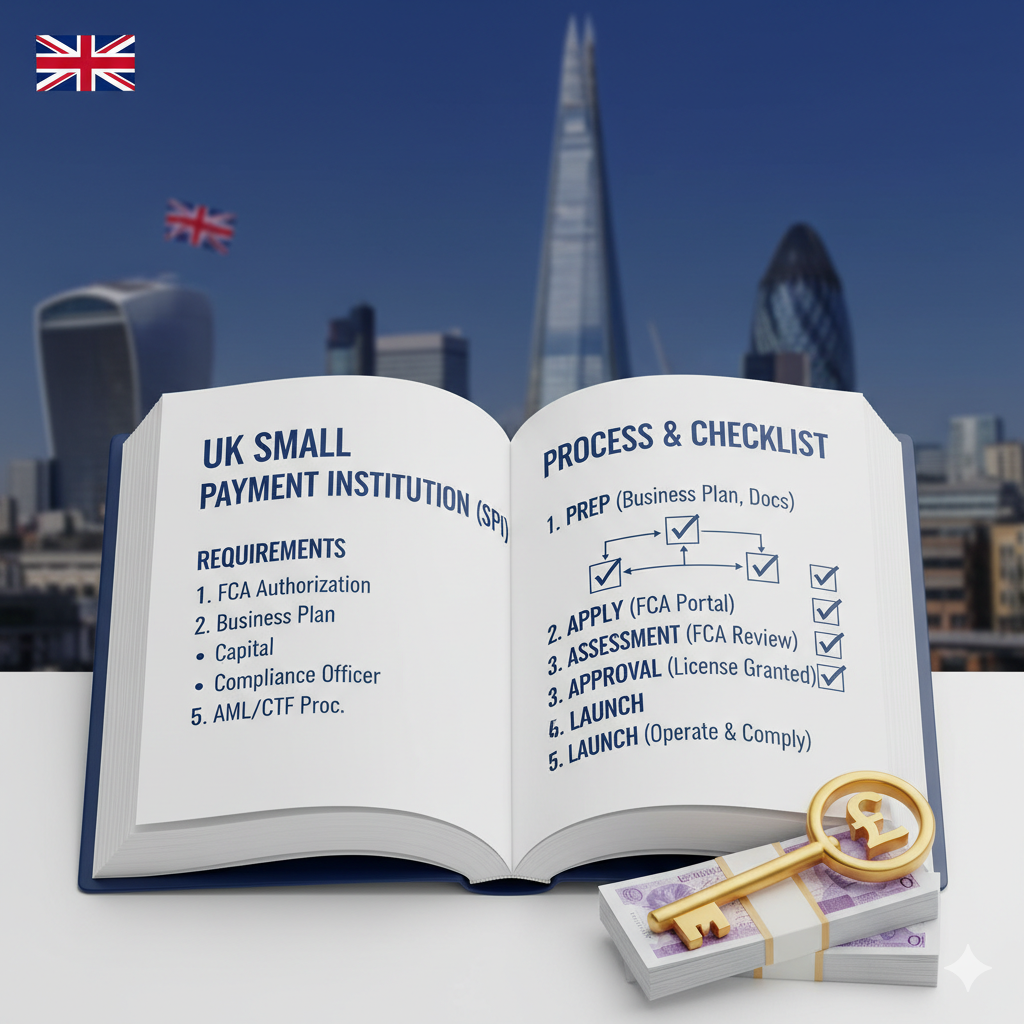Thinking of launching payment services in the UK?
A Small Payment Institution (SPI) is often the fastest, lowest-cost regulated route for startups and fintechs that expect lower payment volumes. This guide explains what an SPI is, who can apply, the must-have documents and policies, the practical steps to register with the FCA, and how 7BaaS can speed your launch.
Book a free consultation at 7BaaS.
What is a UK Small Payment Institution (SPI)?
An SPI is a form of FCA registration for firms that provide payment services but expect limited transaction volumes. SPIs let you offer regulated payment services in the UK while avoiding some of the capital and reporting burdens of a fully authorised Payment Institution — provided you stay within regulatory limits. The SPI route is designed for smaller players (startups, money-transfer operators, niche payment products) who don’t need the full authorisation route. FCA
The most important legal limits & rules (what the FCA requires)
-
Volume cap: The monthly average value of payment transactions over a rolling 12-month period must not exceed €3,000,000. If you expect to exceed that, you must apply for full authorisation as a Payment Institution (API) instead. Legislation.gov.uk
-
Service limitations: SPIs cannot provide Payment Initiation Services (PIS) or Account Information Services (AIS) — those services require different registrations/permissions. FCA
-
Fit & proper persons: The FCA requires that directors and persons responsible for management are fit and proper (no relevant criminal convictions, suitable skills and experience). The law also requires disclosure of any material adverse facts.
-
Application channel & timing: Applications are submitted via the FCA Connect portal. If your application is complete, the FCA aims to assess payments/e-money firm applications within around three months (but more complex or incomplete applications can take longer; planning for up to 6–12 months is prudent).
Who can apply?
-
Any business intending to provide eligible payment services in the UK and expecting volume under the SPI threshold. You’ll normally be a UK-established entity or be able to show a UK presence and operations aligned with the PSRs and FCA guidance.
-
Management must be demonstrably competent and “fit & proper” (no disqualifying convictions, appropriate senior managers, good governance). Legislation.gov.uk
Must-have documentation & systems before you apply (the practical checklist)
Company & corporate
-
UK-incorporated company documents (or evidence of UK establishment / place of business).
-
Certificate of incorporation, constitutional documents, shareholder register, and corporate structure chart.
Business plan & financials
-
Detailed business plan and 12-24 month financial projections (show volumes, revenue, and stress scenarios).
-
Explanation of pricing, refund/chargeback handling and settlement flows.
Governance & personnel
-
CVs and fit-and-proper evidence for directors and senior managers.
-
Organogram and role descriptions (including an appointed Compliance Officer and Money-Laundering Reporting Officer if required).
Compliance & AML
-
AML/CTF policy, KYC procedures, transaction monitoring approach and suspicious activity reporting process. (The FCA places strong emphasis on AML controls.) Legislation.gov.uk
Operational controls & IT
-
Details of payments processing flows, IT security / cyber controls, business continuity plan (BCP), and outsourcing arrangements (third-party vendors).
-
Evidence you can meet PSD2/UK security requirements for online payment services if relevant.
Safeguarding / customer funds
-
SPIs below certain limits typically do not have the same safeguarding obligations as EMIs or authorised PIs, but the FCA and industry bodies strongly recommend arrangements that protect client funds. Consider whether you will voluntarily safeguard or contract a segregated client account with a bank. (This improves buyer/customer confidence and can shorten FCA questions.)
Contracts & banking relationships
-
Bank account(s) proof and letter(s) of intent from partner banks and settlement providers (if required). Proof of card acquirer or PSP integration where relevant.
-
If you rely on third-party services (e.g., processing, wallets, KYC vendor), include contracts and SLAs.
Legal & risk
-
Draft customer T&Cs, privacy policy, dispute/complaints handling process.
-
Risk register and compliance monitoring plan.
Application form & fees
-
You’ll submit the SPI registration application via FCA Connect (use the PSR SPI registration form). Application fees and fee-block rules are published in the FCA FEES manual — check the FCA fee table when you apply.
Step-by-step application process (practical)
-
Prepare documentation — collect the checklist above, prepare policies and supporting evidence.
-
Pre-application support (recommended) — get a short pre-application review or Q&A with a specialist (7BaaS provides practical support — see our Services page).
-
Register on FCA Connect and submit the SPI registration form (PSR SPI application).
-
FCA acknowledgement & case officer — the FCA generally acknowledges receipt quickly and assigns a case officer; they’ll ask clarifying questions. If your application is complete, a decision is often aimed at within ~3 months for payments/e-money firms — but allow time for follow-ups.
-
Respond promptly to queries — the faster you answer the FCA, the quicker the process.
-
Registration & go-live — once registered, you must comply with on-going reporting, AML, and other PSR obligations. If your volumes rise above the SPI limit, notify the FCA and apply for full authorisation.
Typical timelines & costs (what to expect)
-
Preparation time: 2–8 weeks to prepare a solid SPI application (depends on whether policies, bank letters, and senior team CVs are ready).
-
FCA processing: If complete, payments/e-money firm applications are generally assessed within 3 months; complex or incomplete cases may take longer (3–12 months). Always budget conservatively.
-
Fees: Application fees live in the FCA FEES manual and vary by fee-block; confirm the current fee on the FCA site or in the SPI application form. (Fees have changed historically — check the FCA’s FEES pages at submission time.)
Common pitfalls & how to avoid them
-
Incomplete AML documentation — the FCA scrutinises AML/CTF measures; prepare sample KYC files and monitoring logic.
-
Weak senior management fit & proper evidence — provide clear CVs, references, and criminal record checks.
-
No bank or PSP letters — prove you have a route to settle and move customer funds (bank/PSP agreements speed up approval).
-
Underestimating regulatory reporting and resource needs — hiring a part-time compliance officer or using a specialist consultant (like 7BaaS) avoids rework.
How 7BaaS helps
If you want to avoid delays and mistakes, 7BaaS helps with:
-
Pre-application readiness review (we check your policies, KYC flows, business plan). See our Services page
-
Banking & third-party introductions (we help on sponsorship/partnership options or white-label routes)
-
End-to-end support: from application drafting to liaison with FCA and onboarding
-
Alternative speed routes: if you need to start quickly, we can help explore acquiring an existing licensed vehicle or a sponsored / white-label partnership.
Quick SPI startup checklist (copyable)
-
Company incorporation documents and shareholder register
-
Business plan + 12-24 month financial projections
-
CVs + fit & proper evidence for directors/senior managers
-
AML/CTF policy, KYC, transaction monitoring plan
-
IT security, BCP, and outsourcing contracts (vendor SLAs)
-
Bank/PSP letters of intent or accounts for settlement
-
Drafted customer T&Cs and complaint handling policy
-
Completed SPI application form (FCA Connect) + fee paid
-
Point of contact with a regulatory specialist (optional but recommended)



